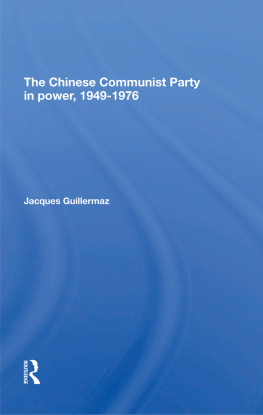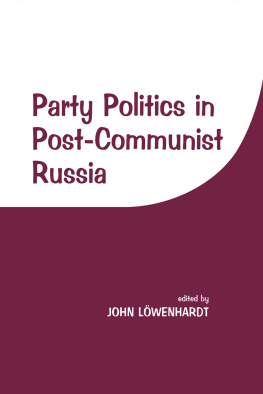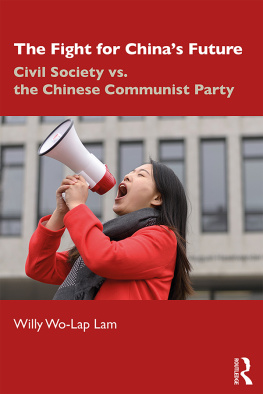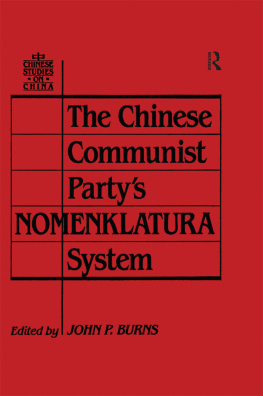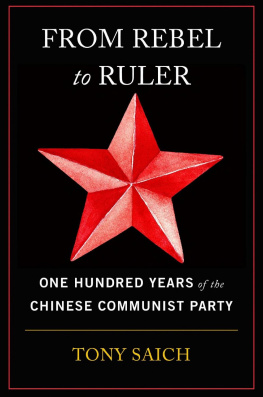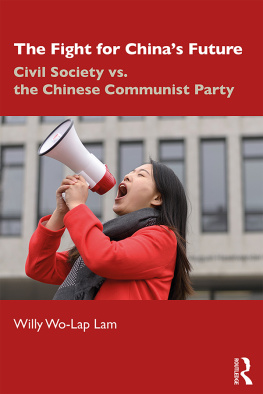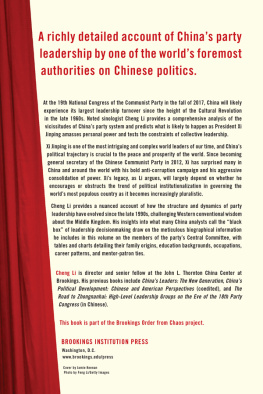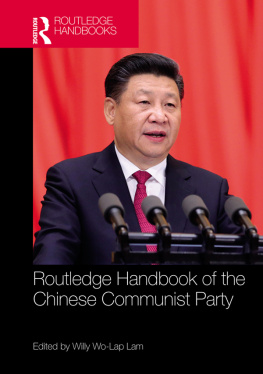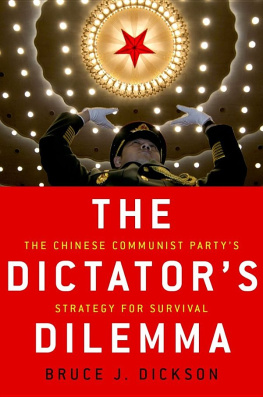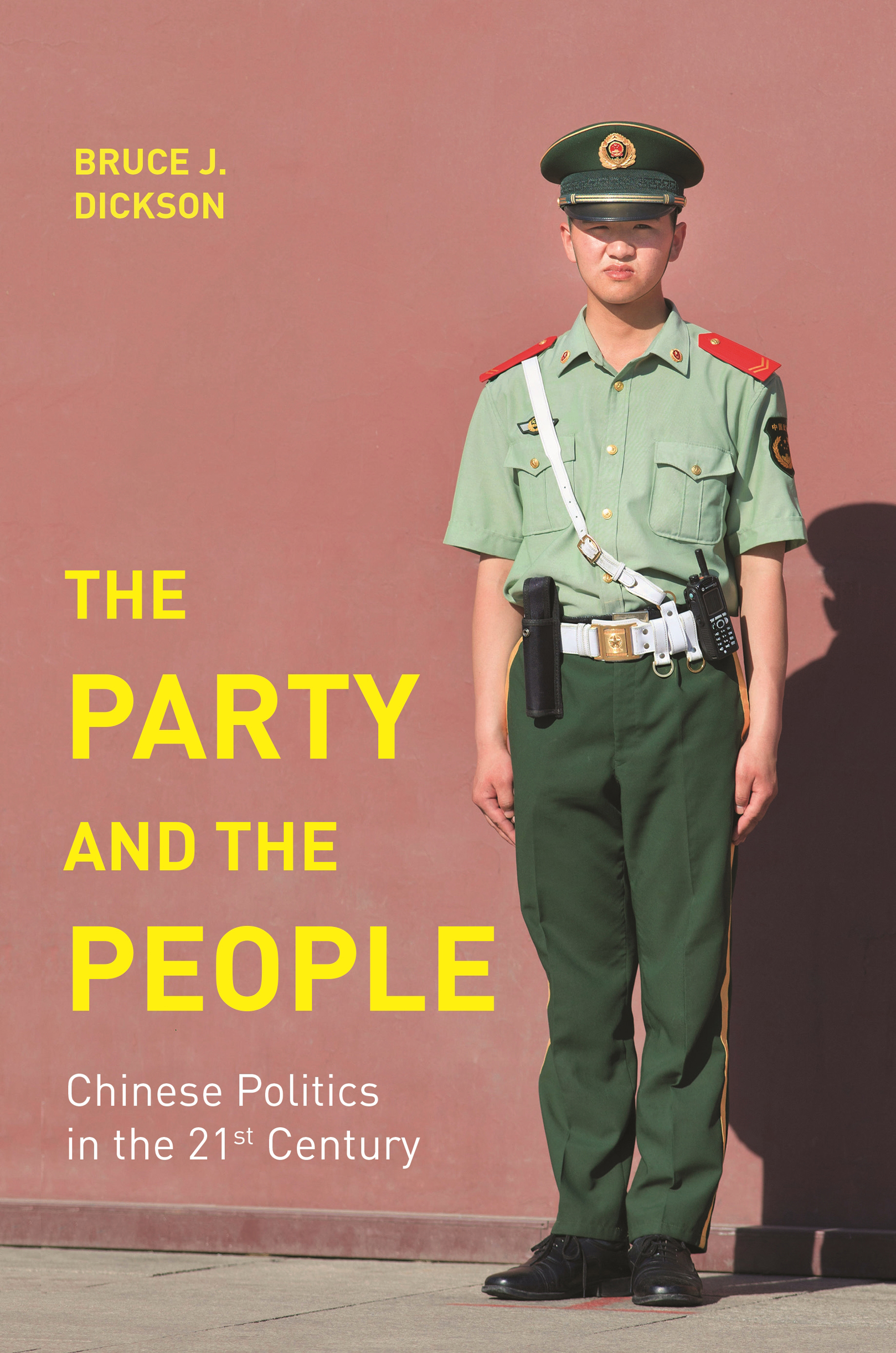THE PARTY AND THE PEOPLE
THE PARTY AND THE PEOPLE
Chinese Politics in the 21st Century
BRUCE J. DICKSON
PRINCETON UNIVERSITY PRESS
PRINCETON & OXFORD
Copyright 2021 by Princeton University Press
Requests for permission to reproduce material from this work should be sent to permissions@press.princeton.edu
Published by Princeton University Press
41 William Street, Princeton, New Jersey 08540
6 Oxford Street, Woodstock, Oxfordshire OX20 1TR
press.princeton.edu
All Rights Reserved
Library of Congress Cataloging-in-Publication Data
Names: Dickson, Bruce J., author.
Title: The party and the people : Chinese politics in the 21st century / Bruce J. Dickson.
Description: Princeton : Princeton University Press, [2021] | Includes bibliographical references and index.
Identifiers: LCCN 2020032357 (print) | LCCN 2020032358 (ebook) | ISBN 9780691186641 (hardback) | ISBN 9780691216966 (ebook)
Subjects: LCSH: Zhongguo gong chan dang. | Political partiesChinaHistory. | Political leadershipChina. | Political planningChina. | ChinaPolitics and government1949
Classification: LCC JQ1519.A5 D5297 2021 (print) | LCC JQ1519.A5 (ebook) | DDC 324.251/075dc23
LC record available at https://lccn.loc.gov/2020032357
LC ebook record available at https://lccn.loc.gov/2020032358
Version 1.0
British Library Cataloging-in-Publication Data is available
Editorial: Bridget Flannery-McCoy and Alena Chekanov
Production Editorial: Natalie Baan
Text Design: Karl Spurzem
Jacket Design: Layla Mac Rory
Production: Erin Suydam
Publicity: James Schneider and Kathryn Stevens
Copyeditors: Kellye McBride and Anne Cherry
Jacket image: Honor guard at Tiananmen Square.
Photo: Tony Vingerhoets / Alamy Stock Photo
For Benita, Andrew, and Caitlin
ACKNOWLEDGMENTS
This book was not my idea. I would not have written it were it not for Eric Crahan, then the political science editor at Princeton University Press. He pitched the idea of a book about the big questions in Chinese politics. His enthusiasm for the book and the potential scope of its audience eventually hooked me in. After he was promoted, Bridget Flannery-McCoy took over the project. She read multiple drafts of the manuscript and made wise suggestions on all aspects of the book, including the framing of the argument, the sequence of topics, and the need for ever more examples to illustrate the conceptual issues throughout the book. It was a joy to work with her, and she made the book unquestionably better with her careful eye for detail and insights on what readers would want to know.
The production team at Princeton kept the process moving on schedule. I would like to thank Natalie Baan, Theresa Liu, and especially Alena Chekanov, for their quick responses to multiple questions. Kellye McBride and Anne Cherry provided judicious copy editing.
Several people made very useful comments on the manuscript, saving me from making unforced errors of facts and interpretations. Martin Dimitrov and three other still anonymous reviewers read the entire manuscript and offered many helpful comments that improved the book immensely (if the shy reviewers ever make themselves known, I owe them a dinner). Others answered questions about specific chapters: I would like to thank Steve Balla, Joe Fewsmith, Iain Johnston, John Kennedy, Andr LaLibert, Marie-Eve Reny, Shawn Shieh, Jessica Teets, and Carsten Vala. And still others helped me through our conversations over the years to understand the topics covered in the book, including Chunhua Chen, Mary Gallagher, Enze Han, Pierre Landry, Lianjiang Li, Melanie Manion, Minxin Pei, Shen Mingming, Victor Shih, Yuhua Wang, and Dan Wright.
I had the good fortune to work with several talented young scholars while writing this book. For their invaluable research assistance, I thank Eleanor Albert, Kendrick Kuo, and Marx Wang. They helped me make sense of a vast amount of the scholarly literature on Chinese politics and to compile several of the case studies.
As always, I want to thank my familymy wife, Benita, and our kids, Andrew and Caitlinfor indulging me during the research and writing process. This book did not involve extended stays in China while they remained at home. Still, research and writing can be a solitary endeavor, and I disappeared frequently into my cone of silence. I hope the end results compensate for being so often away even while I remained at home. This book is lovingly dedicated to them.
THE PARTY AND THE PEOPLE
INTRODUCTION
In September 2011, the people of Wukana village in southeastern Chinarose up in protest. Their elected leaders, they alleged, had sold land to developers without adequate payment to those who had made their livelihoods farming it. They marched on the government headquarters in nearby Lufeng city, demanding both compensation and the right to new elections.
The leaders of Lufeng did not accede to their demands. Instead they sent riot police to Wukan to shut down the protests and occupy the village. Over the course of several months, the village endured a standoff with police, and a handful of protesters were arrested and charged with attacking officers. One of the protesters, Xue Jinbo, died in custody. According to Xues family, the body showed signs of torture, but the official cause of death was cardiac arrest. Tensions between police and the villagers escalated.
Situations like this are all too common in China: leaders ignore the legitimate demands of the people, and punish those who dare to push back against the unpopular and often illegal actions of leaders at all levels of the political system.
And then something extraordinary happened: the provincial leaders stepped in and agreed to the protesters demands. They offered to investigate the compensation the Wukan farmers had received, and they fired the Wukan leaders who sold the land, arranging for new elections to replace them. One of the leaders of the protest, Lu Zuluan, was elected the new village chief.
The protests and their resolution were hailed as a potentially new model of grassroots democracy in China. Provincial party chief Wang Yang, soon to be elevated to the Politburo in Beijing, said he intended to use his peaceful Wukan approach to reform local politics across the province.
But, as is so often the case in Chinese politics, there was more to the story than this. Like the deposed village chief, the newly elected leader was a party member. He had been approved by the provincial party committee, which had intervened to prevent the protests from escalating. The Wukan protests did not spread to other communities, in part because of a blackout on media coverage of the protests, and in part because of fear of arrest. What looked to be a prodemocratic triumph was actually the Chinese Communist Party (CCP) reimposing its authority.
Lu, the new village chief, was himself charged with corruption several years later. Was this delayed retaliation for leading the original protest? Or a reminder that even protest leaders may fall prey to the same bad behaviors as those they once protested against? Its hard to say, because the domestic media blackout continued, and the people of Wukan were warned against speaking to foreign media. What originally seemed like the start of something big turned out to be just one more small-scale event thatwhile it did break out into global newswent unnoticed by most people in China. In the end, the Wukan approach did not spread.



